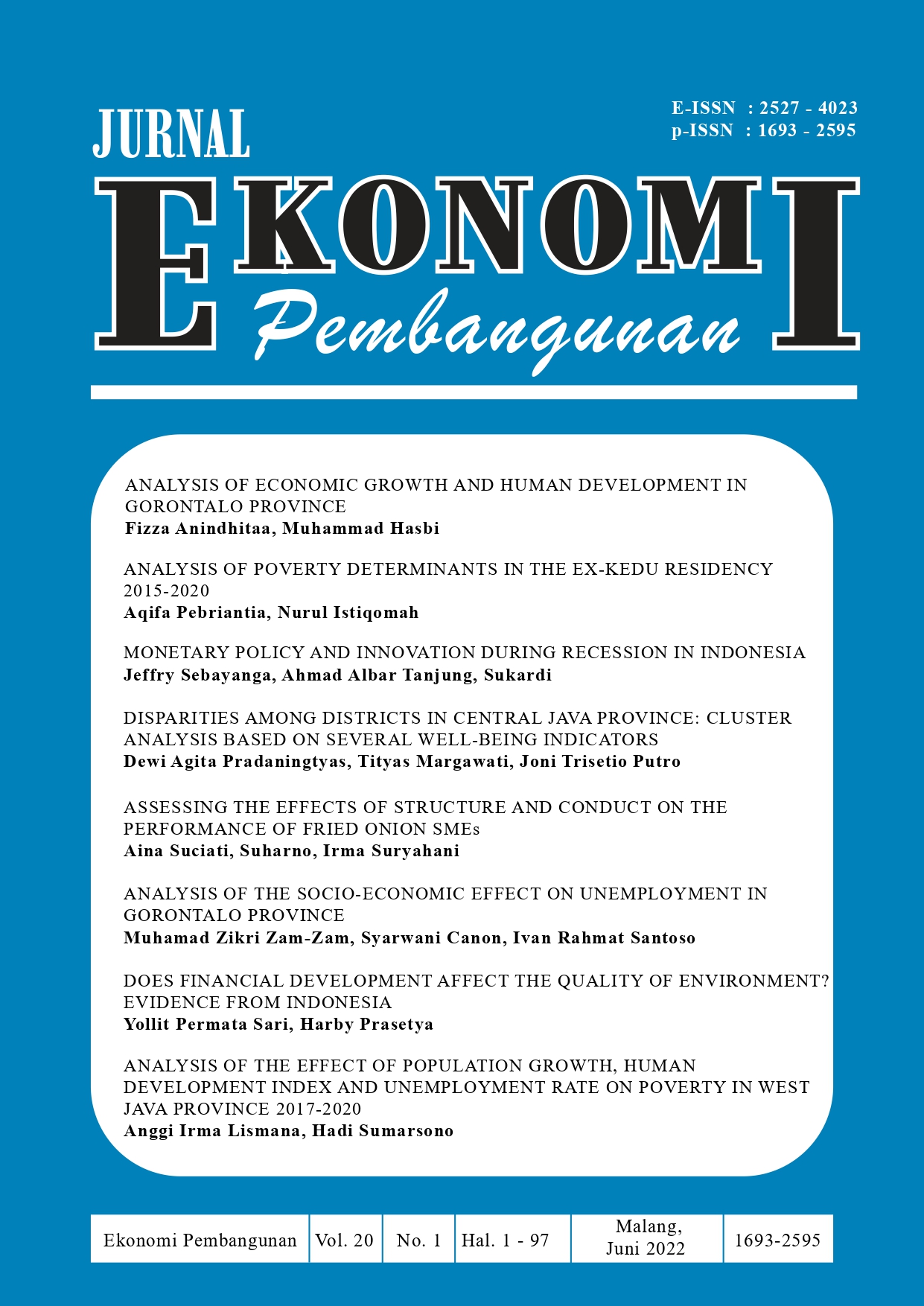The Analysis of Economic Growth and Human Development in Gorontalo Province
DOI:
https://doi.org/10.22219/jep.v20i01.18693Keywords:
Economic Growth; Granger Causality; RegressionAbstract
Economic Development in Gorontalo Province has a high growth rate when compared to the national growth rate, but this is inversely proportional to the value of the Human Development Index (HDI) which is below the national value, even though HDI itself is one of the determining factors for the success of development in an area. Therefore, this study aims to see whether there is a relationship between economic growth and HDI in Gorontalo Province. This research method uses Granger causality analysis technique to see the reciprocal relationship between economic growth and HDI, as well as multiple linear regression analysis to see the effect of each HDI indicator on economic growth in Gorontalo Province. This study found that there is a mutually influencing relationship between economic growth and HDI. Regression analysis also explains that the education indicator of HDI has a positive and significant effect in increasing economic growth in Gorontalo Province, while the Health indicator has no significant effect. Through the results of this study, it is hoped that the Gorontalo Provincial government can determine the right policies to increase the HDI of the community by improving the quality of its community resources so that the economy will also increase.
Downloads
References
Dewi, Nyoman Lilya Santika, dan I Ketut Sutrisna. (2014). Pengaruh Komponen Indeks Pembangunan Manusia terhadap Pertumbuhan Ekonomi Provinsi Bali. Jurnal Ekonomi Pembangunan Universitas Udayana, 3(3), 106-114.
Ezkirianto, Ryan dan Muhammad Findi. (2013). Analisis Keterkaitan Antara Indeks Pembangunan Manusia dan PDRB Per Kapita di Indonesia. Jurnal Ekonomi dan Kebijakan Pembangunan IPB, 2 (1), 14-29.
Gujarati, D.N., & Porter, D.C. (2008). Basic Econometrics Fifth Edition. New York: McGraw-Hill, Inc.
Gujarati, N. D & Porter, D. C. 2013. Dasar-dasar Ekonometrika. Buku 1 dan Buku 2 Edisi 5. Penerjemah: Raden Carlus Mangunsong. Jakarta: Salemba Empat.
Haris. (2019). Pemprov Terus Dukung Sarana dan Prasarana Pendidikan Gorontalo. Retrieved 27 Desember 2019, from https://60dtk.com/pemprov-terus-dukung-peningkatan-sarana-prasaran-pendidikan-gorontalo/.
Haris. (2020). Peningkatan Sarana Kesehatan. Retrieved 19 Maret 2020, from https://infopublik.id/galeri/foto/detail/102220.
Raharti, Rini, Henry Sarnowo, Laila Nur Aprilia. (2020). Analisis Pertumbuhan Ekonomi dan Indeks Pembangunan Manusia di Daerah Istimewa Yogyakarta. Jurnal Perspektif Ekonomi Darusalam Universitas Janabadra, 6(1), 36-53.
Si’lang, Indrasuara, Zamruddin Hasid, Priyagus. (2019). Analisis Faktor-Faktor yang Berpengaruh terhadap Indeks Pembangunan Manusia. Jurnal Manajemen Universitas Mulawarman, 11(2), 159-169.
Todaro, Michael dan Stephen C. Smith. 2003. Pembangunan Ekonomi di Dunia Ketiga. Munandar H, penerjemah; Jakarta: Penerbit Erlangga. Terjemahan dari: Economic Development.
Wei, W.S.S. (2006). Time Series Analysis Univariate and Multivariate Methods 2nd Edition. New York: Addison Wesley.
Downloads
Published
Issue
Section
License
Copyright (c) 2022 Jurnal Ekonomi Pembangunan

This work is licensed under a Creative Commons Attribution-ShareAlike 4.0 International License.
Authors who publish with Jurnal Ekonomi Pembangunan (JEP) agree to the following terms:
- For all articles published in Jurnal Ekonomi Pembangunan (JEP), copyright is retained by the authors. Authors permit the publisher to announce the work with conditions. When the manuscript is accepted for publication, the authors agree to the publishing right's automatic transfer to the publisher.
- Authors retain copyright and grant the journal right of first publication with the work simultaneously licensed under a Creative Commons Attribution-NonCommercial-ShareAlike 4.0 International License that allows others to share the work with an acknowledgment of the work's authorship and initial publication in this journal.
- Authors can enter into separate, additional contractual arrangements for the non-exclusive distribution of the journal's published version of the work (e.g., post it to an institutional repository or publish it in a book), with an acknowledgment of its initial publication in this journal.
- Authors are permitted and encouraged to post their work online (e.g., in institutional repositories or on their website) before and during the submission process, as it can lead to productive exchanges and earlier and greater citation of published work (See The Effect of Open Access).

This work is licensed under a Creative Commons Attribution-NonCommercial-ShareAlike 4.0 International License.






















